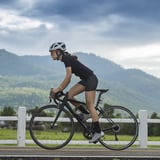lundi 28 septembre 2020
Beginner Cyclists: Check Out These Expert Tips Before Hitting the Road

They say you never forget how to ride a bike, but that doesn't necessarily mean you're fully ready to jump into road cycling as a sport.
Obviously, knowing how to manipulate a bike is an essential part of the workout, but like any activity, cycling involves protocols and best practices that are key for your safety and overall enjoyment - and that goes for beginners and beyond.
If you're thinking about taking up the hobby, check out these tips from Alysha Krall, an Ironman U Certified Coach, before hitting the road.
First, You'll Need a Bike
"The beauty about cycling is that you can never be too young or too old to start," Krall said. "There are many different reasons why someone would want to start cycling. Some people want to explore their towns and countryside, get in shape, stay in shape, spend time with a loved one, do a local century ride, or compete in a triathlon such as an Ironman."
You don't even have be a leisurely cyclist to train for a race. However, what you absolutely do need before getting started, Krall said, is a clear understanding of traffic laws and hand signals - and, of course, the right gear.
A bike will likely be your biggest purchase, and most importantly, Krall said your bike needs to be in good mechanical condition.
"When purchasing your first bike, it is worthwhile to do a little extra research either online or going to talk to your local bike shop," Krall said. "A bike shop can answer questions you may have, recommend different bikes, and tell you about all the local paths and trails to ride on."
As with any new activity, be sure to get the go ahead from your doctor first.
Purchase Safety Equipment
A helmet is a nonnegotiable, so don't saddle up without one. Krall also suggested lights for your bike and a flat repair kit. "You will need a spare tube, hand pump, and tire levers at the bare minimum."
Gear Up
Here's your excuse to buy another pair of bike shorts! While they're not considered essential, Krall said they are valuable for rides that are longer than an hour.
What you definitely need on you, though, is your phone, water, cash, a credit card, or both.
"In addition to those essentials, tell someone the route you are going," Krall said. "It is always better to be over-prepared than underprepared"
Snacks aren't required, but if you have room in your pockets, Krall said to feel free to bring them along, too.
Plan Your Route Wisely
When it comes to mapping out your first ride, Krall said to take your personal fitness level and your confidence on your bike into consideration. As a rule, and to reduce the chances of painful injuries, it's better to start with shorter rides and add on as you feel more comfortable.
"Doing loops around your neighborhood the first couple of rides is a great place to start. Go five miles and, if you're feeling great, do another loop!"
After you've figured out your mileage, you'll probably want to plan when to take that ride.
"Cycling is supposed to be fun, and you should do it when it best fits your schedule," Krall said. "Some people take their bikes to work and cycle on their lunch break. Some go after work or before dinner. Biking to and from work is also an option, but I would not recommend it during your first week of cycling."
If you do plan on biking to and from work, Krall said you should own all-weather cycling gear and have front and rear lights installed on your bike.
If you can do so safely, consider making cycling a group activity. "One of the best things with cycling is biking with a buddy, so get your friends and family on a bike, too!"
Click here for more health and wellness stories, tips, and news.










0 comments:
Enregistrer un commentaire